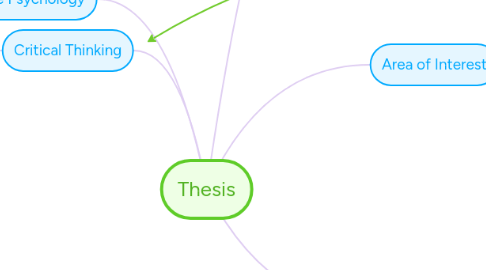
1. Critical Thinking
1.1. Introduction
1.1.1. Syllogism
1.2. Key themes
1.2.1. Economics
1.2.1.1. Introduction
1.2.1.2. Key themes
1.2.1.2.1. Rationalist
1.2.1.2.2. Homo Econimicus
1.2.1.2.3. Reason
1.2.1.2.4. Nueroeconomics
1.2.1.2.5. Opportunity costs Link to switching costs
1.2.1.3. Summary
1.2.2. Pillars of CT
1.2.2.1. Logic
1.2.2.2. Argumentation
1.2.2.3. Rhetoric
1.2.2.4. Background knowledge
1.2.2.5. Attitudes &Values
1.3. Summary
1.3.1. Findings
2. Cognitive Psychology
2.1. Introduction
2.2. Key themes
2.2.1. Psychological Backdrop
2.2.1.1. Psychological Safety
2.2.1.2. Psychology Contracts
2.2.2. Constr’cts
2.2.2.1. Systems
2.2.2.1.1. System 1
2.2.2.1.2. System 2
2.2.2.2. Modes / Types
2.2.3. Selective attention
2.2.3.1. Distraction
2.2.3.2. Lack of attention
2.2.3.2.1. Link to system 1
2.2.4. Hueristics
2.2.4.1. Biases
2.2.4.2. Shortcuts
2.2.4.3. Bias and Heuristics Tradition
2.2.5. Emotions
2.2.5.1. Passion is positive for confidence
2.2.5.2. Homeostatic regulation
2.2.5.2.1. Drives and motivations
2.2.5.2.2. Reward and punishment
2.2.5.3. Bias
2.2.5.4. Lack of emotion is worse than excessive emotion
2.2.6. Attention
2.2.6.1. http://en.wikipedia.org/wiki/Attention
2.2.7. Cognitive Load
2.2.8. Occupational stress
2.2.8.1. http://www.choixdecarriere.com/pdf/6573/2010/ColliganHiggins2005.pdf
2.2.8.2. Bullying http://www.hse.gov.uk/research/hsl_pdf/2006/hsl0630.pdf
2.2.9. Theory of Mind
2.2.10. Neurocognition
2.2.11. Debiasing
2.2.12. Focus and switching costs Link to opp cost
2.3. Summary
3. Reboot
3.1. Context
3.2. Organisational Management
3.3. Decision Making
4. Context
4.1. Introduction
4.1.1. Syllogism
4.2. Key themes
4.2.1. Historic
4.2.1.1. Intro
4.2.1.2. Key Themes
4.2.1.2.1. Stable
4.2.1.2.2. ‘Slow’ moving
4.2.1.2.3. Economics
4.2.1.2.4. Analysis first
4.2.1.3. Summary
4.2.2. Prevaliing
4.2.2.1. Unstable
4.2.2.1.1. Not changed
4.2.2.1.2. Just a long period of relative stability
4.2.2.2. Emergence of Systems Thinking/Awareness
4.2.2.3. Fast-moving Complex
4.2.2.3.1. In fact…
4.2.2.3.2. In an environment
4.2.2.3.3. CAS
4.2.2.4. Variable
4.2.2.4.1. Systems Thinking
4.2.2.5. Economics
4.3. Summary
4.3.1. Findings
5. Approach
5.1. Introduction
5.1.1. Syllogism
5.2. Key themes
5.2.1. Intro - that things have moved on… fMRI after most improvement methods..?
5.2.2. Historic
5.2.2.1. Long term methods
5.2.2.1.1. Methods / Tools
5.2.2.1.2. Management
5.2.2.1.3. New Idea
5.2.2.2. Viability
5.2.2.3. Skill sets
5.2.3. Prevaliing
5.2.3.1. Changed?
5.2.3.2. Viability
5.2.3.3. Skills Gap?
5.2.4. Systems Thinking
5.3. Summary
5.3.1. Findings
5.3.1.1. Introduction
5.3.1.1.1. Syllogism
5.3.1.2. Key Themes
5.3.1.3. Summary
5.3.1.3.1. Findings
6. Area of Interest
6.1. Hypothesis driven by an observation…
6.1.1. Post MSc
6.1.1.1. Subject: Strategic Change Management
6.1.1.2. Focus: Complexity Theory in Strategy
6.1.1.3. Deep Learning Gained: The importance of people in strategic management
6.1.2. Post MA
6.1.2.1. Subject: Business Management
6.1.2.2. Focus: Advanced Performance Management
6.1.2.3. Deep Learning Gained: 'Systems Thinking' and the importance of holistic perspective over the reductive.
6.1.3. Ongoing interest in decision making and how people/managers process information at the cognitive level.
6.1.4. Made worse by the Age of Austerity
6.1.5. Efficacy of existing change management systems
